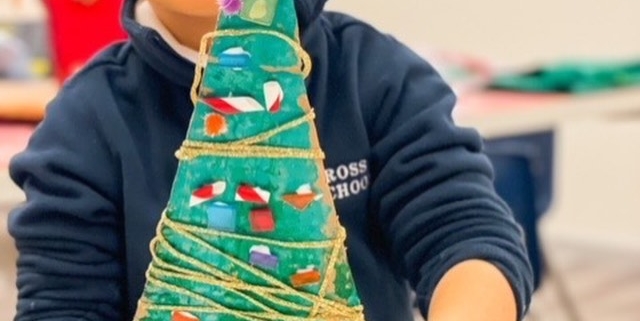Ways To Keep Kids Jolly Over the Holiday Break
For several weeks, the house is a flurry of delicious smells, wrapping paper, twinkling lights, and company. It’s easy to get caught up in preparations and adult-level planning. While your child may seem to be coasting along with the holly, jolly mood of the household, big feelings they’re unprepared to handle may be bubbling below the surface, about to come to a head at the least opportune moments.
No one wants a meltdown ever, let alone during these days where we’re all a bit stressed, cooped up, and often in the judgmental eye of well-meaning loved ones. Here’s your quick guide to setting your kid up for success as best you can and navigating through some of the common situations encountered at some point over the winter break.
The Situation: They’re anxious.
The Fix: If your child seems anxious, ask about it—and listen. Let them know it’s okay to feel overstretched from time to time. Offer comfort—like a nice warm lap cuddle—and distraction, whether it’s reading a book or getting outside to run around in the snow.
How to Head it off: Your anxiety can be contagious. Start preparations early and set a few goals to tackle each day off work—when you have more time to devote. When traveling somewhere, try to give yourself double the travel time so you’re not always rushing around. Every day, take care to share something positive about your day and avoid sharing the stressful details with your child—who may internalize your stress without the ability to handle it.
The Situation: They’re overtired.
The Fix: Know how much sleep your child needs based on age. Children will often drop from two naps to one between 2 and 3, and stop napping between 3 and 4 years of age. If you’ve gotten off your routine, try scaling back 30 minutes at a time until you’re back on track. If your child refuses to sleep, an hour of quiet time with books and a few toys up in their room can be just as helpful.
How to Head it off: Routines are important. Keep in mind that your child’s day is regulated down to the minute at daycare and school. Though you may be busy and overbooked, try to maintain some constants in your schedule. Try to eat meals and snacks at a consistent time. Allow an hour for bath, books, and screen-free down time at the end of the day. Set aside small chunks of the day for play, so your child feels attended to, even if you are tempted to say you’re “too busy.”
The Situation: They’re greedy.
The Fix: Once the screaming, crying, and grabbing starts, it’s time for the toy in question to go up on the mantle—or somewhere the kids with the gimme-gimmes can see it but not touch it. Instead of putting your child in time-out, put “the toy in time-out.” It can be surprising how fast that de-escalates. Kids often forget what they were fighting about and stop power-struggling over the toy and move onto other matters. Consequences must be given when kids act inappropriately. If your child is prone to greedy outbursts, explain the rules of gift getting—that there is to be no tantrums or the toy goes away.
How to Head it off: As adults, we understand the best gifts are the ones we give—especially intangible gifts like our time. It’s the family traditions the kids will remember when they’re older—the sledding, the movie nights, the cookie baking, the fun and games with cousins. Gifts can be overwhelming—though it’s hard to prevent spoiling young children especially when grandparents, aunts, and uncles are involved.
The best you can do is request “experience” gifts rather than stuff. Ask your child to pick 10 toys they’re willing to donate “to make room for more.” Have children help you thoughtfully pick out and wrap gifts for others. Older children can help you with a donation project to give to the needy. Be sure to intentionally plan a few activities together during the week off, whether it’s skating, a movie, or a museum day.
The Situation: They won’t eat anything.
The Fix: Choose your battles wisely and assess what’s truly important. It’s not that your child is trying to defy you by balking at the food served. More likely, your child is not used to the holiday menu and all the surrounding chaos has them feeling already out of their comfort zone.
Rather than demanding that your child finish everything on the plate or raising your voice and power-struggling in front of the family, aim for wonderful memories of time spent with loved ones. A few extra cookies from grandma won’t hurt once a year. Instead, encourage your child to try a bite or two before deciding what and how much to eat. This teaches valuable self-regulation skills. Later, if your child is hungry, offer a healthy snack like an apple or a cheese stick.
How to Head it off: If you know you’ve got a picky eater on your hands, ask your child to help pick a few items to serve or pack on the way to the party. Better yet, have your child help prepare something with you. Consistently reinforce certain ground rules (like no dessert unless the dinner is eaten or no in-between meal snacking) all year round—not just during the holidays.
The Situation: They’re cranky.
The Fix: Even without a global pandemic, the holidays can crank up the stress for children. Relatives they don’t see often may focus a lot of uncomfortable attention on them with comments on how they’ve grown or changed, hugs and kisses without asking, or a barrage of questions.
Combine the crowd of new people with the pressure to dress up in fancy (not to mention uncomfortable) clothes, take perfect family photos, and act pleasantly at all times despite how they may be feeling inside. It’s a lot. Changes in activity levels and managing multiple conversations can be stressful for adults too, so imagine how the kids must feel!
You can help your child through the day by setting clear expectations and sharing your plans with them. When your child acts up, breathe and respond calmly, resisting the urge to mirror their anger level. You’re the adult and impressionable children are looking at you as an example of how to act.
Your words matter. Try to use humor to deflect an awkward situation into something positive. Set the right tone by telling children how you expect them to act—such as instructing them to “Please chew with your mouth closed,” rather than “stop chewing with your mouth open.”
How to Head it off: A child’s life can feel out of control. They’re continuously told what to do and forced to go along with their parents’ plans. Transitions can be a prime time for tantrums. While a meltdown because it’s time to use the potty or time to leave grandma’s house may seem trivial, it can mean the world to an overstimulated child. Being compassionate and sensitive to this, try to prep your child for the day’s agenda. Set times, offer gentle reminders of what’s to come, and be mindful that your child may “need to do” a few more tasks before they’re ready to move onto the next activity.
The Situation: They’re sad.
The Fix: The blues are possible, especially after the excitement of Christmas has passed. Somehow, in a household full of toys and stimulation, a child can feel suddenly lost, lonely, and bored. Perhaps a toy broke or they tried something new that didn’t work. Maybe they’re feeling down because it’s the first holiday without a pet or a grandparent. They may need you to step in and help them spin their situation into something positive or manage a sudden tidal wave of sadness. They may just need a hug and an attentive ear. “Time-ins” with mommy or daddy can work wonders. Some children may thrive on physical activities like a nature walk or sledding, depending on where you live.
How to Head it off: While you don’t want to overschedule the whole vacation from school, planning at least one post-Christmas activity can give your child something nice to look forward to before going back to school. A play date with a friend to try out all those new toys might fit the bill.
Make feelings a regular topic of discussion in your home, especially pointing out how feelings are transient, coming and going from one moment to the next. A good book for younger children that highlights this is On Monday When It Rained by Cheryl Kachenmeister. Asking your child what they’re thinking about or feeling each day can keep the channels of communication open.
The Situation: They’re reclusive.
The Fix: While some kids thrive on your lap and in your personal space bubble at all times, others naturally seek solitude in their rooms. Researchers believe wanting and needing alone time can be healthy. Developmentally, learning to be along is a skill that can be refreshing and restorative once mastered.
If your child craves a little alone time, that’s okay—just let them know you love them and are available when they need you. Consider proposing a low-key activity to bring them closer later—like watching a movie with popcorn and cocoa—or snuggling up to a favorite holiday story.
How to Head it off: Encourage your child to engage in acceptable “check-out” behavior when life gets stressful or when it seems there’s nothing to do. Let your child know it’s good to have healthy outlets like reading, drawing, writing in a journal, or playing a quiet game and that their bedroom is a safe space for calming down, creative expression, and spiritual renewal.
If you’re worried your child is isolating and isn’t opening up enough, consider discussing while playing a sport or taking a walk around the block. You may also consider talking to your pediatrician to get a referral to a mental health counselor to ensure your child has someone to confide in during late adolescence when talking to mom and dad may seem “uncool.”
Holidays Can Be Challenging, But Present an Opportunity for Renewal
No one’s perfect—neither you, nor your child. We’re all doing the best we can with the best we’ve got on any given day. As parents, our reserves are easily depleted as we try to be everything to everyone. At the same time, our children’s developing minds and bodies are not yet fully equipped for homeostasis. Take a deep breath (of the candy cane kissed air), hold your child tightly, tell them you love them and you’re there for the good days and the bad, and practice self-care to get through these days. Our children are only little—and need us this much—for so long. A little understanding and perspective can go a long way.
Live in the East End and need to blow off some steam? You’re always welcome at The Shine Studio. Drop in for a class, sign up for winter break activities, or ask about our party entertainment and craft bags. It takes a village…



